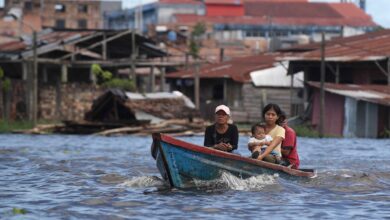Parenting: These are Some of the Best Countries to have Children in the World
In LatinAmerican Post, we made a list of 4 countries around the world with reasonable rates in areas such as parental leave, education, stable politics, and income equality, which make them "paradises" to having children.

Photo: Freepik
LatinAmerican Post | Christopher Ramírez
Escucha este artículo
Leer en español: Crianza: estos son algunos de los mejores países para tener hijos en el mundo
Year after year, private organizations such as US News or international organizations such as the United Nations (UN) publish some rankings of the best countries in the world on critical issues such as the environment, mobility, education, and health. However, one, in particular, has been on the lips of governments and organizations in recent weeks: the list of the best countries to raise children (or be one of them).
In the case of the US News ranking, the 2022 report (carried out in collaboration with the Wharton School of the University of Pennsylvania in the United States) covers the perception of more than 17,000 people surveyed in 85 countries worldwide. This classification is based on the following attributes that are detailed on their official website: "caring about human rights, being considered family-friendly, their environment for gender equality, being seen as happy, having an equal income, being safe and have well-developed public education and public health systems."
For its part, the UN, through its Children's Fund (Unicef), focuses on making reports focused on specific issues such as education, food, or, like this year, "Places and spaces" concerning child welfare. Thus, based on both rankings, as well as on other types of information, at LatinAmerican Post we decided to make a list of four ideal countries for raising children in the world.
1. Denmark
The European country was the one that US News showed in its 2022 ranking (perception and not analysis) as the best country in the world to have children, occupying this position for the third consecutive year.
As a central point, they highlight the parental leave system in Denmark, which allows both the mother and the baby's father to have 24 weeks (6 months) of paid leave as long as they live together. This, of course, also guarantees the presence of both adults in the first months of your son or daughter's life.
As in most countries, mothers have an extra benefit: four additional weeks before the expected delivery date, according to the Nordic Cooperation. Likewise, "salaried employees can also transfer up to 13 weeks of leave to their partner."
This added to other issues such as income equality, political stability, and security, making the quality of life in Denmark, and therefore family, obtain 99.9 points out of 100 possible in this ranking.
2. Japan
For its part, Japan occupies a privileged place among the best countries to breed since it has several factors highlighted by Unicef. First, Japan ranks second among the countries with the best relationship between children “and the world around them.” This means they present significant advances in urban green spaces and road safety, among other aspects.
Regarding security, it has the lowest homicide rate among the countries analyzed by this entity: 0.2 per 100 thousand inhabitants. For its part, according to OECD reports on educational systems, it ranks 12th out of 76 countries in this organization, making it one of the states with the best education in the world.
It may interest you: How can mindfulness help children's lives?
3. Canada
Like Denmark, Canada has an enviable quality of life, according to the US News ranking, with a score of 97.9. Canadians (according to their perception) enjoy a good job market (100 points out of 100 possible), which naturally gives them high economic stability (96 points) and optimal family development.
Likewise, the citizens of this country say they feel security guarantees (91 points), good public education (92.9), and a well-developed public health system (89.4).
4. Estonia
Finally, there is Estonia, which presents essential points regarding children's health care, with remarkable advances in favor of having less air pollution and fewer pesticides, among others.
Also, according to UNICEF and the OECD, Estonian children enjoy an excellent educational system, displaying exceptional math, science, and literacy abilities. The only countries that surpass it in these areas are Asians.
However, cognitive skills are just as critical in education as soft ones. This is reported by an OECD study, which details that a 5-year-old Estonian child tends to recognize emotions better and deal with them, either individually or collectively, than one of the same age in powers such as the United States or England.
Thus, the Nordic countries take the lead in raising children, and the odd American and Asian countries, especially those with political stability and high-income equality.




